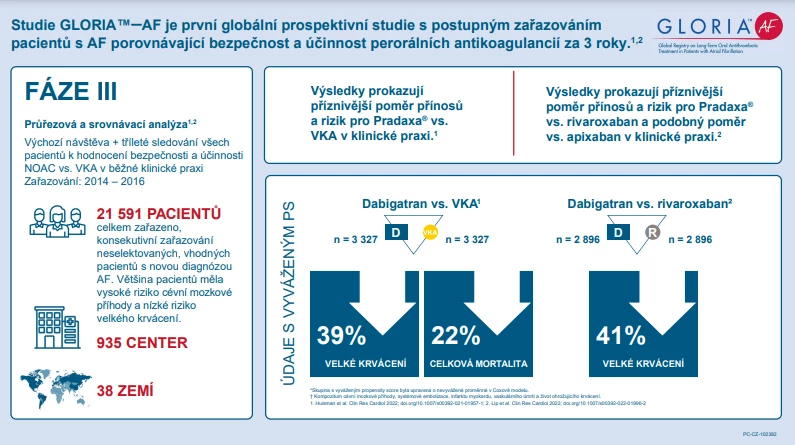-
Medical journals
- Career
Cardiovascular Interventions with Continued Therapy with Dabigatran − Insights from the GLORIA-AF Study
12. 1. 2023
An analysis using data from an international registry of patients with newly diagnosed atrial fibrillation evaluated the safety and efficacy of continued therapy with dabigatran during cardioversion or atrial fibrillation ablation, pacemaker implantation, and coronary angiography with possible stent implantation.
Introduction
New or direct oral anticoagulants (NOACs/DOACs) are gradually replacing vitamin K antagonists (VKAs) in the prevention of cerebrovascular accidents (strokes) in individuals with non-valvular atrial fibrillation (AF). Currently, however, we lack sufficient prospective data on the management of DOAC administration during cardiovascular (CV) interventions. The analysis of the GLORIA-AF study, cited below, therefore focused on evaluating the direct thrombin inhibitor dabigatran specifically in the management of CV interventions.
The GLORIA-AF Study
GLORIA-AF is an international prospective registry of patients with newly diagnosed AF and an increased risk of cerebrovascular accidents. Over a period of 2 years, the occurrence of strokes or systemic embolism and major bleeding was monitored up to 8 weeks after CV intervention performed under uninterrupted dabigatran therapy.
Results
The monitored group included 479 patients who underwent a total of 599 CV interventions. 69% (n = 412/599) of the interventions were performed under uninterrupted use of dabigatran, specifically 84% (n = 299/354) of cardioversions, 43% (n = 38/89) of AF ablations, 43% (n = 25/58) of pacemaker implantations, and 51% (n = 50/98) of coronary angiographies/stent implantations.
Patients were monitored for an average of 8.4 weeks after the intervention. During the follow-up, there was 1 case of major bleeding and 1 systemic embolic event (hazard ratio [HR] 0.25% for both events, 95% confidence interval [CI] 0.01–1.36%).
Conclusion
In patients with newly diagnosed non-valvular atrial fibrillation, more than two-thirds of cardiovascular interventions (mainly cardioversions) were performed over 2 years under uninterrupted therapy with dabigatran. This was associated with a low incidence of major bleeding and a low risk of strokes or systemic embolism. The observational results confirm the efficacy and favorable safety profile of dabigatran in real clinical practice for these patients.
(lexi)
Source: Van der Wall S., Lip G., Teutsch C. et al. Low bleeding and thromboembolic risk with continued dabigatran during cardiovascular interventions: the GLORIA-AF study. Eur J Intern Med 2021; 91 : 75−80, doi: 10.1016/j.ejim.2021.05.020.
Did you like this article? Would you like to comment on it? Write to us. We are interested in your opinion. We will not publish it, but we will gladly answer you.
Labels
Internal medicine Cardiac surgery Cardiology Neurology
Login#ADS_BOTTOM_SCRIPTS#Forgotten passwordEnter the email address that you registered with. We will send you instructions on how to set a new password.
- Career


